Key takeaways:
- Medical decision support systems enhance clinical decision-making by analyzing patient data and clinical guidelines, improving patient outcomes.
- Science serves as the foundation of healthcare, empowering professionals to advocate for patients by translating research into effective treatment protocols.
- Patient advocacy fosters a trusting relationship between healthcare providers and patients, emphasizing the importance of patient involvement in care decisions.
- Integrating scientific knowledge into practice, along with interdisciplinary collaboration, is essential for improving patient outcomes and enhancing the quality of care.
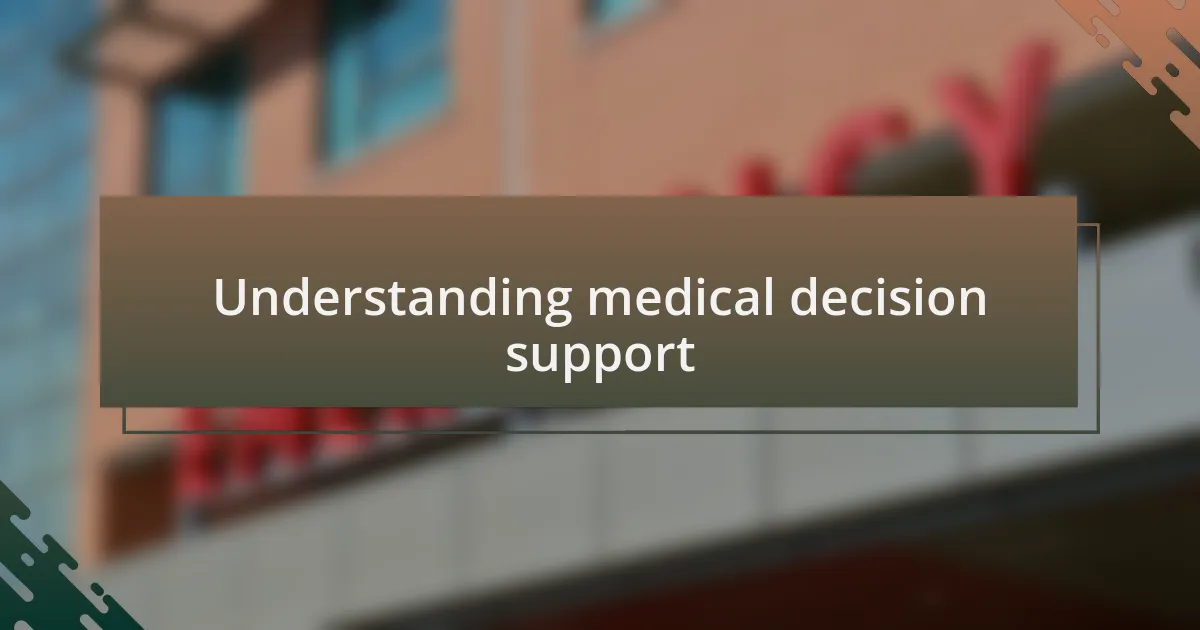
Understanding medical decision support
Medical decision support systems are designed to assist healthcare professionals in making informed clinical decisions. Drawing from vast databases, they analyze patient data alongside clinical guidelines to provide recommendations that can enhance patient outcomes. I remember a time when I faced a complex case; using a decision support tool helped me navigate the different treatment options, ultimately leading to a more tailored approach for my patient.
What strikes me about these systems is how they blend technology with human intuition. Have you ever wondered how easy it would be to miss critical information when juggling multiple patients? Medical decision support helps bridge that gap, allowing practitioners to focus on what truly matters—patient care. I once witnessed a colleague use a decision support system during a hectic shift; it not only saved time but also reassured the team that they were on the right track.
Ultimately, understanding medical decision support means recognizing its powerful role in reducing errors and promoting evidence-based practice. Reflecting on my experiences, I can’t stress enough how such tools can transform the clinical landscape. They empower healthcare providers, encouraging a collaborative environment where patient well-being takes center stage.
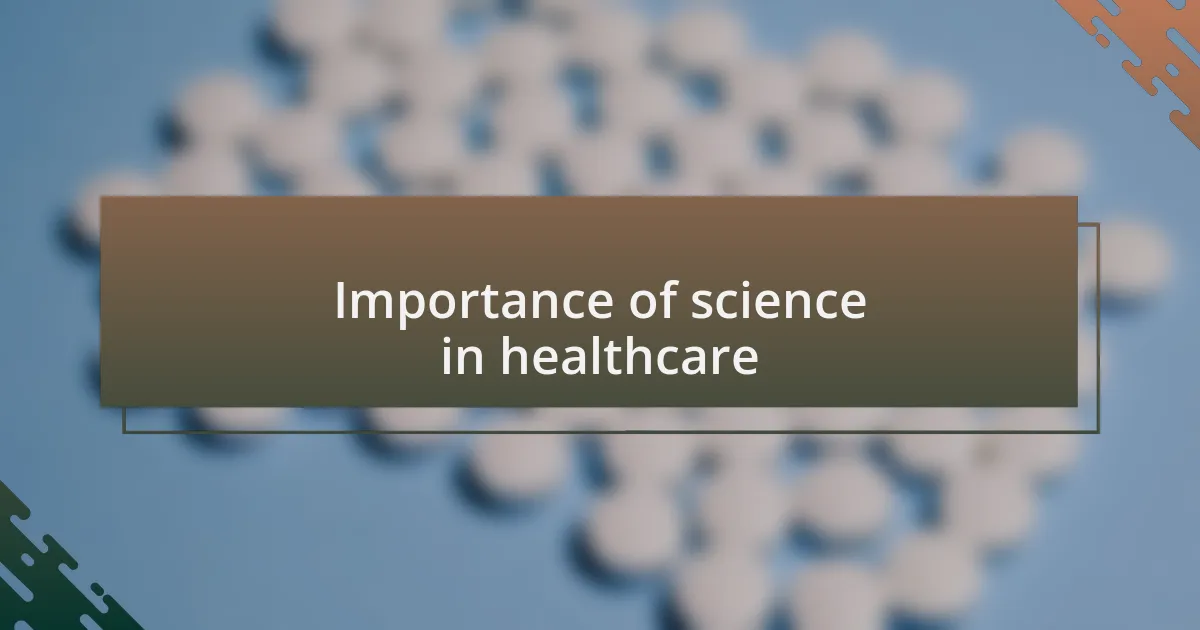
Importance of science in healthcare
The role of science in healthcare is foundational, serving as the bedrock upon which clinical practices are built. I often think about my early days as a healthcare professional when scientific literature felt daunting yet incredibly enlightening. The moment I realized how thorough research could lead to breakthroughs in treatments and patient care was like a light bulb going off—suddenly, I saw science as the bridge connecting theory to tangible health improvements.
In my experience, having a robust understanding of scientific principles helps me advocate more effectively for my patients. For instance, I recall a time when a new treatment protocol emerged from rigorous trials demonstrating significant benefits for patients with chronic illnesses. It was thrilling to discuss this with my peers and to witness the change it brought about in patient recovery. The excitement of seeing science translated into practice made me appreciate that every piece of research contributes to a larger narrative of hope and healing.
Engaging with science also empowers patients to ask the right questions about their care. I remember when a patient, armed with knowledge from recent studies, felt confident discussing treatment options with me. It prompted a conversation that deepened our doctor-patient relationship and tailored their treatment plan effectively. Isn’t it fascinating how knowledge can transform fear into empowerment? That’s the beauty of integrating science into our daily practice—it not only enriches our professional insights but also fosters a culture of informed decision-making among patients.
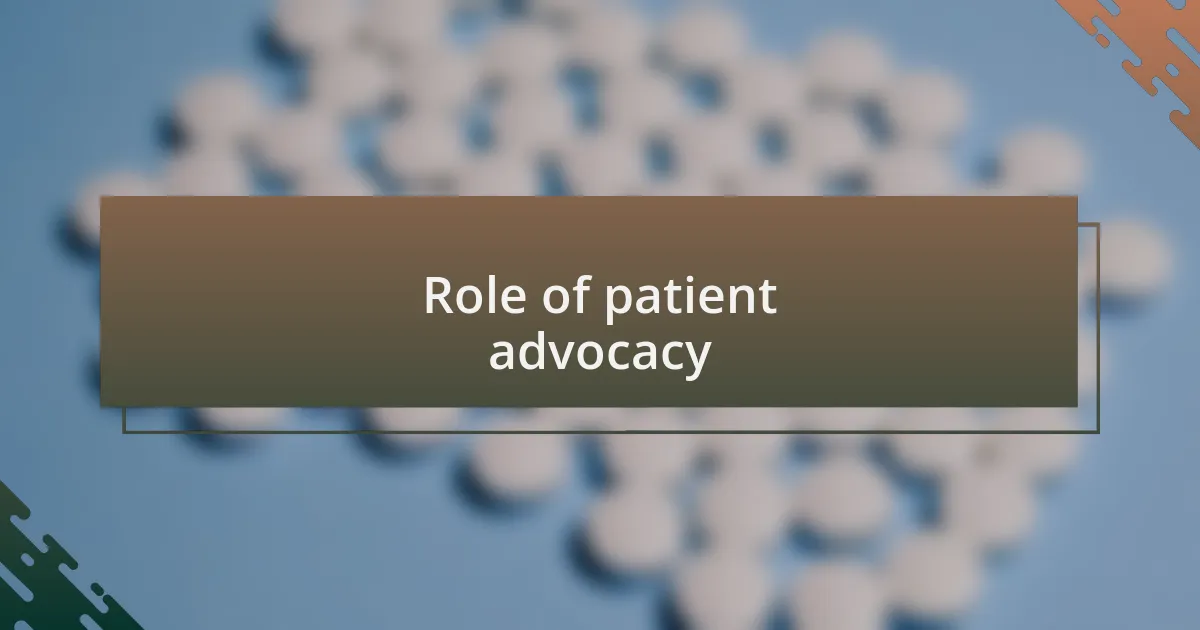
Role of patient advocacy
Patient advocacy plays a pivotal role in ensuring that the voices of those receiving care are heard and respected. I vividly recall a conversation with a patient who expressed frustration over not being included in their treatment decisions. It struck me then how crucial it is for patients to have not just a say, but also the resources to understand and discuss their options. This experience reinforced my belief that advocacy is about giving patients agency over their health journeys.
Advocacy also fosters a trusting environment between patients and healthcare providers. I’ve seen firsthand how my support for a patient’s concerns led to a more collaborative approach to their care. When I took the time to listen and respond to their questions, it transformed our interactions. I often wonder, how much better would healthcare be if every provider consistently engaged in this manner?
Moreover, effective advocacy involves educating patients about their rights and the healthcare system. There was a time when I led a small workshop aimed at demystifying healthcare processes for my patients. Observing their relief upon gaining clarity about insurance and treatment options was incredibly rewarding. It illuminated for me that advocacy isn’t just about navigating challenges—it’s about empowering patients with knowledge so they can make informed decisions that align with their values and preferences.
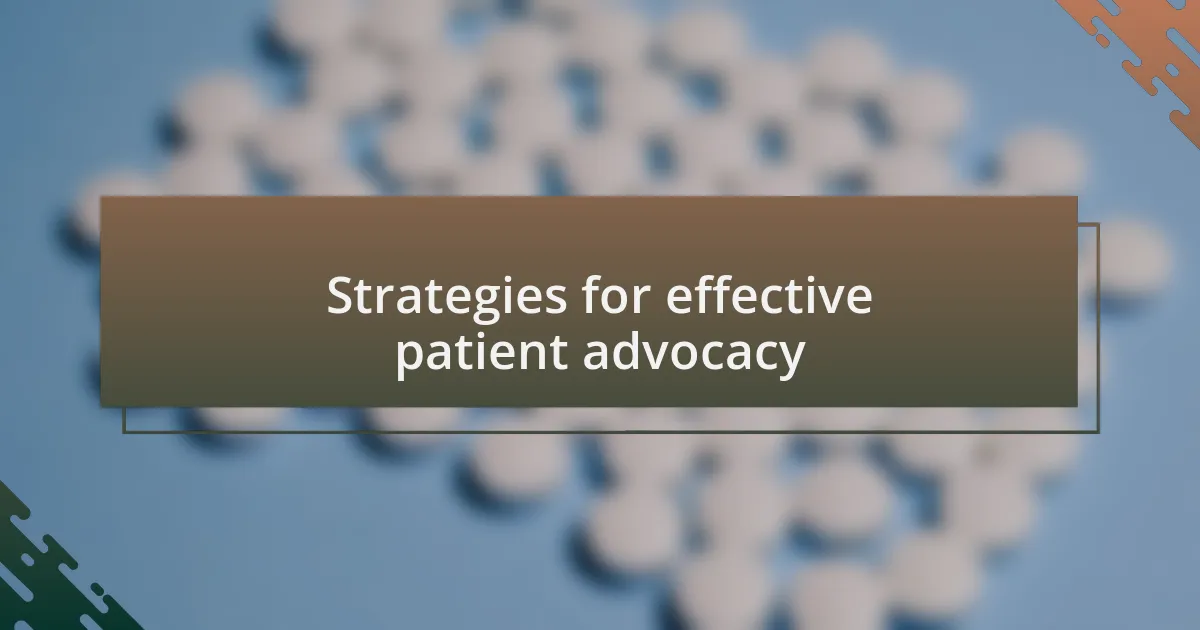
Strategies for effective patient advocacy
One effective strategy for patient advocacy is to foster open communication. I recall a time when a patient was hesitating to voice their concerns during consultations. By actively encouraging them to share their thoughts, I noticed their confidence rise. It made me realize how crucial it is to create an environment where patients feel safe to speak up. Have you ever considered how your words can influence someone’s willingness to engage?
Another powerful approach is to utilize storytelling to convey complex medical information. I often share relatable experiences or case studies to help patients grasp their diagnoses and treatment options better. This method not only demystifies medical jargon but also humanizes the experience. Seeing the understanding light up in a patient’s eyes is incredibly fulfilling. It makes me think, how can we use our own narratives to bridge the knowledge gap in healthcare?
Lastly, providing resources for support can significantly enhance advocacy efforts. One instance stands out to me: I connected a patient with a local support group that shared similar experiences, and the difference it made was profound. They felt less isolated and more empowered to participate in their care. It begs the question, what resources are we overlooking that could make a world of difference for our patients?
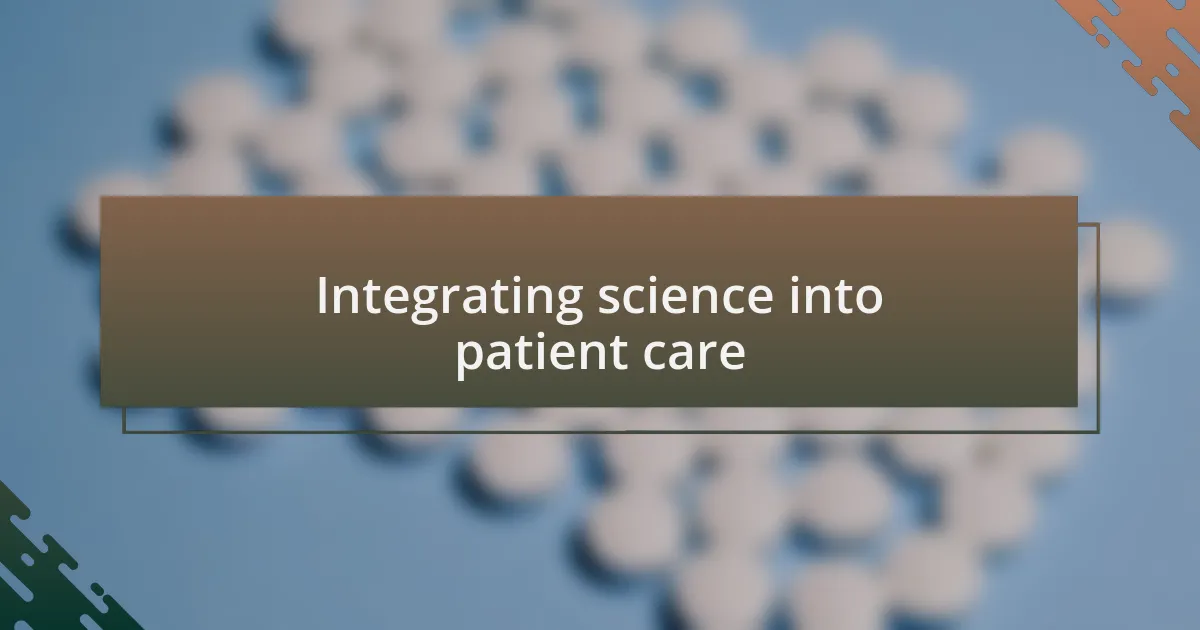
Integrating science into patient care
Integrating scientific research into patient care means translating evidence into practice, which can truly transform outcomes. I’ve seen firsthand the impact of applying the latest treatment guidelines during clinical decision-making. For instance, when I incorporated findings from a recent study on diabetes management, my patients experienced lower blood sugar levels and better overall health. Have you ever witnessed the difference that informed decisions can make in a patient’s life?
Moreover, collaborating with interdisciplinary teams is essential for implementing evidence-based practices. I often work alongside nurses, pharmacists, and dietitians to discuss complex patient cases. This collaboration not only enriches the care provided but also ensures that patients receive well-rounded support that addresses all aspects of their health. It makes me wonder, how often do we engage with various healthcare professionals to enhance our strategies?
Ultimately, staying up-to-date with scientific advancements can feel overwhelming, but it’s crucial for effective patient care. I remember going to a workshop about emerging therapies in oncology, which reignited my passion for continuous learning. I left feeling motivated to integrate these insights into my discussions with patients. Isn’t it fascinating how ongoing education can shape the way we approach treatment and empower our patients in their journey?
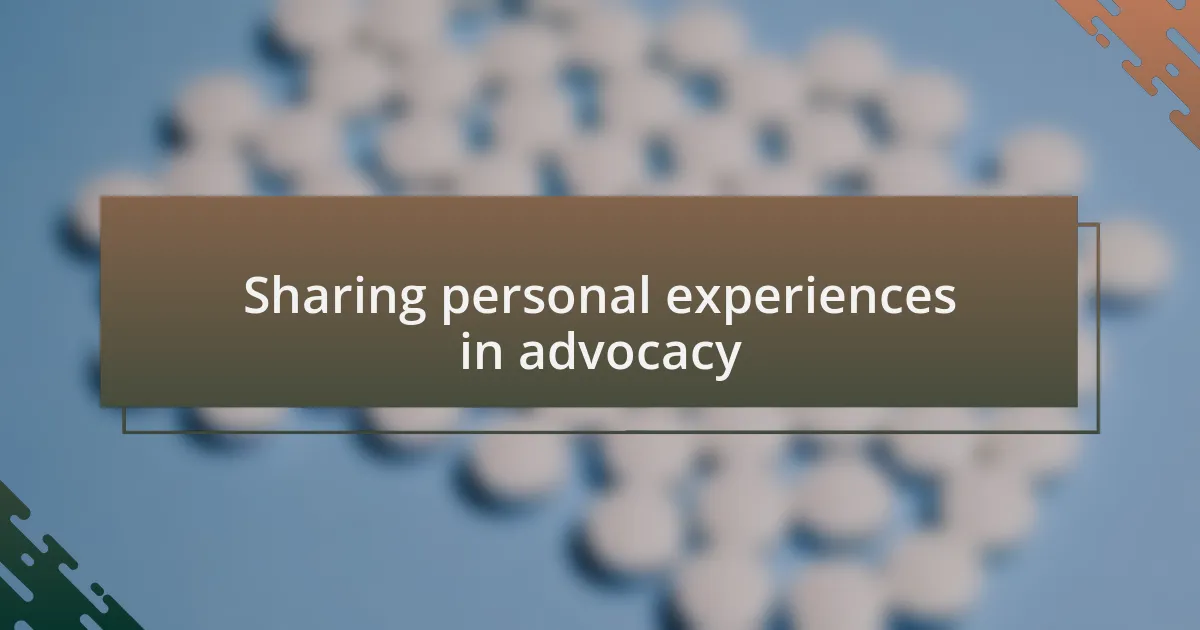
Sharing personal experiences in advocacy
Advocacy can take many forms, and my journey began unexpectedly during a community health fair. While volunteering, I met a woman diagnosed with early-stage cancer who felt lost and unsure about her treatment options. Listening to her fears ignited a passion in me to not only share scientific knowledge but also to empower patients to navigate their healthcare journeys effectively. Have you ever felt that spark to help someone see the light in a dark situation?
One particularly powerful experience was when I spoke at a local school about the importance of science in understanding health issues. I shared my story of a family member battling addiction and how scientific research on mental health informed our family’s support strategies. Watching the students’ faces shift from confusion to understanding was truly rewarding. It made me realize that sharing personal narratives can bridge the gap between complex medical concepts and real-life experiences. How often do we use our stories to inspire others toward healthier choices?
I’ve also found that advocacy means actively seeking feedback from patients about their experiences with care. After implementing a new approach to pain management, I asked patients for their thoughts. Their responses taught me how vital it is to listen, not just prescribe. I remember one patient’s heartfelt thank-you note that shared how my advocacy had made her feel seen and valued in her treatment. Isn’t it amazing how fostering open dialogue can change the landscape of patient care?